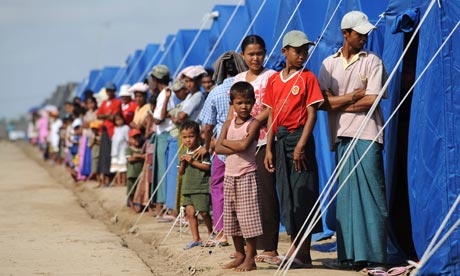Global warming could create 150 million 'climate refugees' by 2050
Environmental Justice Foundation report says 10% of the global population is at risk of forced displacement due to climate change 
By John Vidal in Barcelona, guardian.co.uk, Tuesday 3 November 2009 00.05 GMT Global warming will force up to 150 million “climate refugees” to move to other countries in the next 40 years, a new report from the Environmental Justice Foundation (EJF) warns. In 2008 alone, more than 20 million people were displaced by climate-related natural disasters, including 800,000 people by cyclone Nargis in Asia, and almost 80,000 by heavy floods and rains in Brazil, the NGO said. President Mohamed Nasheed of the Maldives, who presented testimony to the EJF, said people in his country did not want to “trade a paradise for a climate refugee camp”. He warned rich countries taking part in UN climate talks this week in Barcelona “not to be stupid” in negotiating a climate treaty in Copenhagen this December. Nasheed urged governments to find ways to keep temperature rises caused by warming under 2C. “We won’t be around for anything after 2C,” he said. “We are just 1.5m over sea level and anything over that, any rise in sea level – anything even near that – would wipe off the Maldives. People are having to move their homes because of erosion. We’ve already this year had problems with two islands and we are having to move them to other islands. We have a right to live.” Last month, the president held a cabinet meeting underwater to draw attention to the plight of his country. The EJF claimed 500 million to 600 million people – nearly 10% of the world’s population – are at risk from displacement by climate change. Around 26 million have already had to move, a figure that the EJF predicts could grow to 150 million by 2050. “The majority of these people are likely to be internally displaced, migrating only within a short radius from their homes. Relatively few will migrate internationally to permanently resettle in other countries,” said the report’s authors. In the longer term, the report said, changes to weather patterns will lead to various problems, including desertification and sea-level rises that threaten to inundate low-lying areas and small island developing states. An expert at the Institute for Sustainable Development and International Relations in Paris recently said global warming could create “ghost states” with citizens living in “virtual states” due to land lost to rising seas. …
Global warming could create 150 million ‘climate refugees’ by 2050
There will be over 2 billion climate refugees within just 20 years — a significantly higher number then reported in the Climate Refugee report.
This figure is based upon population density in low-lying coastal areas (sea level increase, aquifer invasion) and those also affected by drought and others by heavy rains.
There will also be massive food shortages developing all over the world, which will cause huge refugee problems and starvation.
This is happening much faster then current models can accurately predict.
I am perplexed why these reports consistently fail to account for the sheer magnitude and numbers — data which we already know and have in our possession of sufficient accuracy to make claims like "150 million" seem downright paltry.
This seems wildly optimistic. If there were 20 million displaced in 2008, it seems that in 40 years there will be 800 million, not 150 million…except as effects worsen, which they inevitably will, the number of climate refugees per year should increase as time goes on, making the number far higher. Or are they factoring in dead people? Dead people can't be refugees!
Doomers don't think in millions; we think in billions.